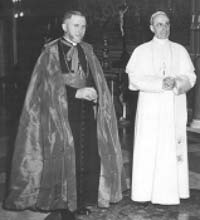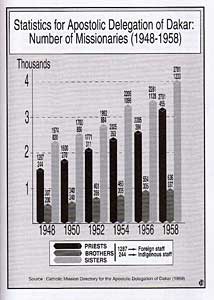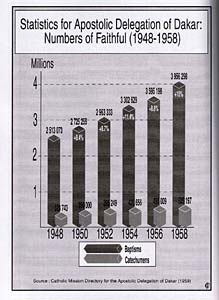

![]()
![]()
|
Newsletter of the District of Asia July - December 2005 Archbishop Lefebvre and Rome By Fr. Emmanuel Du Chalard
As early as 1947 (not counting his years in the French Seminary), Archbishop Lefebvre frequented the Roman Curia in an assiduous way. As archbishop of Dakar, but especially as Apostolic Delegate (1948-1959), every year in October he came “to give an account of his administration”. For whatever concerned the Apostolic Delegation (a political and diplomatic position), he mainly dealt with the Secretariate of State, and for other matters of the missionary apostolate, he met prelates of the Congregation of the Propaganda Fidei. Occasionally, for other more particular matters he also frequented other Dicasteries, such as the Congregation of Religious for the foundation of native religious Congregations, for the establishment of religious communities, for difficulties between various Orders. He also met with the Congregation for the Eastern Rites on the occasion of the arrival of the Maronites in Africa.
|
 |
|
|
Archbishop
Lefebvre and Pope Pius XII |
|
A particular circumstance allowed him to have a very deep knowledge of the gears of the Vatican administration as well as a great number of Church dignitaries: he was in fact appointed by John XXIII as a member of the Central Preparatory Commission for Vatican II, a commission composed of one hundred and twenty members, both cardinals and bishops.
To this Roman experience, one can add his relations with the political, diplomatical, economical and cultural authorities of the many countries under his care, either as Apostolic Delegate, or as Superior General.
Archbishop Lefebvre had the great advantage of an exceptional experience and an intimate knowledge of the Roman and universal situation of the Church. He knew very well religious life, seminaries, the mechanism of Episcopal nominations, the functioning of Episcopal Conferences (he himself started many — although these were not the Post Vatican II Bishops’ Conferences based on false collegiality – Ed.), diocesan clergy, religious congregations, etc.
One cannot be surprised then of the very active part he played during the II Vatican Council, as the true leader of the minority gathered in the Coetus Internationalis Patrum, and as one of the main moral authorities that reacted in front of the Conciliar revolution.
The Letter and the Spirit of Canon Law
Archbishop Lefebvre, imbued with the soul of a builder and of a powerful organizer (as is proven by his reputation in Africa, and especially in Dakar), never saw himself as the founder of a congregation. When he in fact did lay the foundations of the Priestly Society of St Pius X, he was already 64 years old, with a magnificent ecclesiastical career behind him. He did this foundation truly compelled by Divine Providence. And now one can say that there was a reason for the said Divine Providence to have given him, in the course of this career, such an intimate knowledge of the gears of the Roman Curia: he would need it all during the tremendous crisis that was about to explode.
Archbishop Lefebvre was always careful to get all the canonical and ecclesiastical authorizations in the foundation of his work, to root it deeply in the Church and to ensure heavenly blessings. The Statutes of the SSPX, the creation of the seminary of Ecône, the opening of the first houses of the SSPX, the incardination of its members, all was done according to the rules and in the strict observance of Canon Law.
When the Church authorities, in an unjust, illegal manner contrary to faith, began to destroy the SSPX, first by withdrawing any previously given authorization, then in denying any new authorization, he found himself obliged to by-pass the laws. Nevertheless, he never believed that the present situation of crisis entitled him absolute freedom from Church laws. On the contrary, he endeavor to follow the letter of Canon Law as much as possible, and when this was truly impossible, then he followed the spirit of the law, laying land-marks which would be necessary for a future regularization.
We still have magnificent lectures on this topic in which the Prelate explains the spirit of Canon Law, what is implicit in it, and how theology is the support of all Church Laws. “Salus animarum suprema lex – Salvation of souls is the supreme law” — this traditional axiom has always guided the major decisions of the Archbishop, though always by safeguarding the principle of authority, for instance, by avoiding to ordain priests without incardination in the Church, ‘vagi’ as these are called, freelance priests having each their own personal apostolate. It is clear that the situation in which the SSPX and its Founder found themselves from 1974 onwards did not facilitate the relations with Rome. Nevertheless, Archbishop Lefebvre never lost his Roman spirit, or his will to keep contact with Rome. Proof of this can be found in the many collections of exchanges and meetings between Rome and Ecône (for ex. in French, La condamnation sauvage de Mgr Lefebvre, or Mgr Lefebvre et le St Office, published timely be Itinéraires, — or in English, Apologia pro Marcel Lefebvre, in three volumes, and Archbishop Lefebvre and the Vatican, both published by Angelus Press).
Official contacts
The Prelate never slammed the door in Rome’s face. On the contrary, he always went to the limit of what was possible in dialogue and discussions. Whenever he saw the slightest possibility to improve the situation with Rome, he would go there forthwith.
From the beginning of the SSPX, he met more frequently with the Holy Office, in Rome, and especially with Cardinals Seper and Ratzinger (the present Pope). This is a further proof, if needs be, that the ‘problem with Ecône’ has never been a mere disciplinary matter, but rather a doctrinal issue, born of the present crisis in the Church. The only constant reproach made to him was that he did not accept the novelties. This is truly to his honor, and one day the Church will thank him for his heroic resistance in front of the disastrous innovations coming from the highest Roman authorities. Proof of the pudding, one day Cardinal Oddi had this strange observation: “The drama with Archbishop Lefebvre is that he has too much faith”!
Unofficial Contacts
In any case, there was not a single year that did not see the Archbishop coming to Rome at least once, but usually, often.
Besides his meetings at the Holy Office (whenever they were granted him), Archbishop Lefebvre never hesitated, especially in delicate moments, to consult Roman personalities, such as Cardinals Palazzini and Oddi, but also the Salesian Don Dario Composta, the Conventual Padre Coccia, and others whose names we must withhold by discretion.
In the first years of John Paul II’s pontificate, many meetings took place in the Holy Office, under the aegis of Cardinal Seper. Now, behind the scenes, this Cardinal was about to solve the “Lefebvre Problem” by a real court case. Once, at that time, when the Archbishop met Don Francisco Putti, founder of the well-informed periodical SiSiNoNo, Don Putti convinced him that a trap was being laid and that to save the SSPX, he had to cut off the discussions, refusing to be judged by judges, three of which had already condemned him. From that day onward, the Prelate was infinitely thankful to Don Putti and never missed visiting him each time he came to Rome.
Audience with Paul VI
On this issue of contacts with Rome, one must mention the papal audiences. All in all, two audiences in 21 years! This is not much for this man who had met the pope so frequently in the course of his ecclesiastical career. Especially when one thinks that this man was front page news of the media, and that the said popes, who always spoke of ‘dialogue’, ‘ecumenism’, ‘repentance’, received non-stop representatives of the Orthodox, of the Protestants, of the Jews, of Buddhists, of Islam, of Marxism, etc. The first audience was with Paul VI, in Castel Gandolfo, on September 11, 1976, at the end of the ‘hot summer’. The Archbishop arrived in Albano (the SSPX house near Rome) on September 9. In order to settle the last minute details of this unexpected audience, the next day he went to Rome to discuss the matter at the Ecclesiastical College of Capranica, with Don Dominico Labellarte, the organizer of this meeting. To meet in such a place was in fact quite ironic, since some time earlier, this same College declared itself favorable to the Italian referendum allowing … the legalization of divorce!
For the details of this audience, as well as for the next, readers are asked to refer with great profit to the Biography of Archbishop Lefebvre, by Bishop Tissier de Mallerais, published by Angelus Press.
Audience with John Paul II
The second audience was with pope John Paul II at the beginning of his pontificate. It was organized by Cardinal Siri, archbishop of Genoa, and took place on November 18, 1978.
The new pope appeared to have the vague desire to settle the whole matter rather rapidly, but he reconsidered the issue and entrusted it to the care of the Roman Curia, where, again, it got stuck in the mud.
This was their first and last meeting (exception made of their meetings during Vatican II, but then they did not know each other). Subsequently, Archbishop Lefebvre often returned to Rome, always ready to meet the pope, but the latter never expressed the desire of further meetings. As a result, the Founder of the Society of St Pius X departed for his eternity, on March 25, 1991, without having seen his work rehabilitated nor the crisis of the Church being stopped.
His first successor (1983-1994), Fr. Franz Schmidberger, was never able to meet pope John Paul II. His second successor, Bishop Bernard Fellay (1994 - today) had a brief audience with pope John Paul II on December 30, 2000, but nothing concrete came out of it.
And now, under the new pontificate of Benedict XVI, we continue in the line traced for us by Archbishop Lefebvre in his November 21, 1974 Declaration, a real Magna Charta for all those who love the Roman Church:
“We hold firmly with all our heart and with all our mind to Catholic Rome, Guardian of the Catholic Faith and of the traditions necessary to the maintenance of this faith, to the eternal Rome, mistress of wisdom and truth.
We refuse on the other hand, and have always refused, to follow the Rome of Neo-Modernist and Neo-Protestant tendencies, which became clearly manifest during the Second Vatican Council, and after the Council, in all the reforms which issued from it.”
(From Fideliter, no. 167, Sept.-Oct. 2005, pp.26-31. The author of this article, Fr. Du Chalard, is one of the most senior priests of the SSPX, ordained by Archbishop Lefebvre in 1976, and many years stationed in the SSPX house in Albano, near Rome.)

